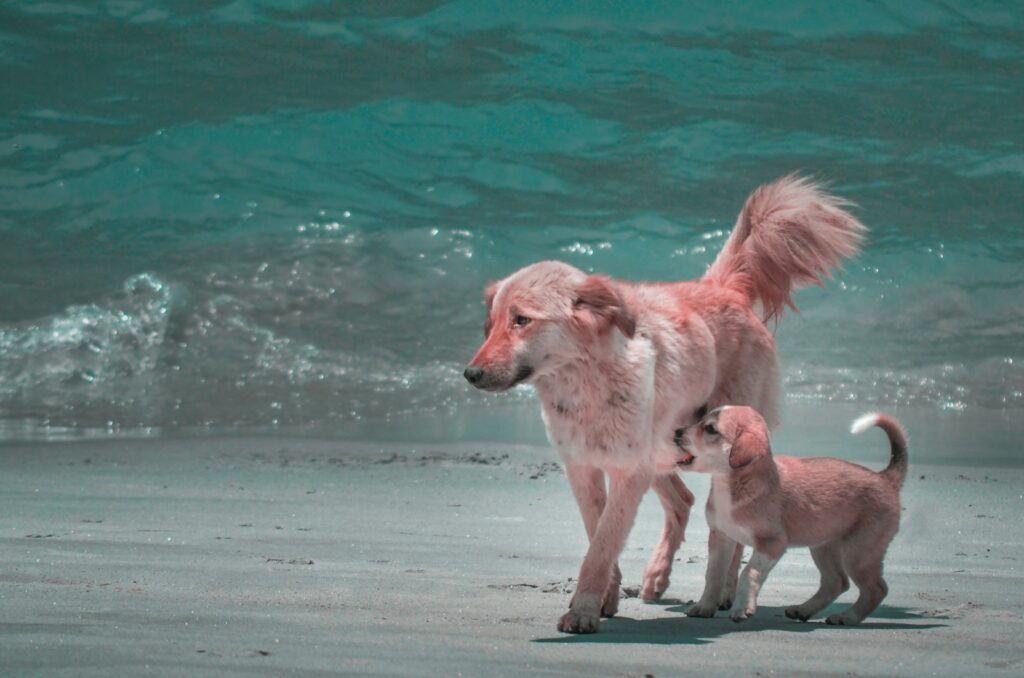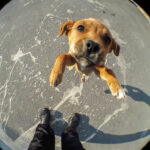Dogs are often hailed as man’s best friend, cherished for their loyalty, affection, and companionship. But just like humans, dogs can experience emotions, including jealousy. Have you ever noticed your furry friend acting a little possessive when you give attention to another pet or person? That’s jealousy at play! In this article, we’ll delve into the fascinating world of canine emotions and explore why dogs sometimes feel jealous, how it manifests, and what we can do to help them cope.
Understanding Canine Emotions
Before we dive into the complexities of jealousy in dogs, it’s essential to understand that our canine companions experience a wide range of emotions. While they may not express them in the same way humans do, dogs can feel happiness, fear, sadness, and yes, jealousy too.
The Emotional Lives of Dogs
- Happiness: Dogs wag their tails, jump around, and sometimes even smile when they’re happy.
- Fear: Common signs of fear in dogs include trembling, cowering, and avoiding eye contact.
- Sadness: Dogs may exhibit lethargy, loss of appetite, or whining when they’re feeling down.
Dogs are incredibly adept at reading human emotions, often mirroring our feelings and responding accordingly. But what about their own emotions, such as jealousy? Let’s take a closer look.
Why Do Dogs Get Jealous?
Jealousy is a complex emotion rooted in feelings of insecurity, fear of loss, and a desire for attention or resources. While dogs don’t experience jealousy in the same way humans do, they can still exhibit behaviors that suggest they’re feeling left out or threatened by the presence of another pet or person. Here are some reasons why dogs may get jealous:
1. Territorial Instincts
- Natural Instincts: Dogs are territorial animals by nature, often marking their territory to assert dominance and protect valuable resources like food, toys, and attention.
- Competition: When they perceive another pet or person encroaching on their territory or receiving attention from their human, dogs may feel compelled to assert themselves and reclaim their space.
2. Fear of Losing Affection
- Bond with Humans: Dogs form strong emotional bonds with their human caregivers, viewing them as members of their pack.
- Fear of Rejection: Just like humans, dogs can experience fear of abandonment or rejection. When they see their human giving attention to someone else, they may worry that they’re being replaced or sidelined.
3. Resource Guarding
- Protecting Resources: Dogs may exhibit jealousy-like behaviors when they feel threatened by the prospect of losing access to valuable resources like food, toys, or even their human’s affection.
- Possessiveness: Some dogs are more prone to resource guarding than others, displaying possessive behaviors like growling, snapping, or attempting to hoard objects they consider valuable.
4. Lack of Socialization
- Social Skills: Proper socialization plays a crucial role in shaping a dog’s behavior and emotional development.
- Isolation: Dogs that haven’t been adequately socialized with other pets or people may struggle to share attention or resources, leading to jealousy-like behaviors when they perceive competition.
How Does Jealousy Manifest in Dogs?
Jealousy can manifest in various ways, depending on the individual dog and the context of the situation. While some dogs may exhibit subtle signs of jealousy, others may display more overt behaviors to grab their human’s attention or assert dominance over perceived rivals. Here are some common signs of jealousy in dogs:
1. Attention-Seeking Behaviors
- Pawing: Dogs may paw at their human or nudge them with their nose to demand attention.
- Whining or Barking: Vocalization is another way dogs express their desire for attention or affection.
- Interfering: Dogs may physically insert themselves between their human and another pet or person to monopolize attention.
2. Aggressive Behaviors
- Growling or Snapping: Dogs may growl or snap at other pets or people to assert dominance or protect valuable resources.
- Resource Guarding: Some dogs exhibit possessive behaviors like guarding food bowls, toys, or sleeping spots from perceived threats.
3. Avoidance or Withdrawal
- Ignoring: In some cases, dogs may sulk or withdraw from interactions with their human or other pets if they feel jealous or insecure.
- Hiding: Dogs may seek out hiding spots or retreat to a quiet corner to avoid confrontation or competition.
4. Destructive Behaviors
- Chewing or Digging: Dogs may engage in destructive behaviors like chewing furniture or digging holes as a way to vent their frustration or anxiety.
- Attention-Seeking Destruction: Some dogs may intentionally destroy objects or belongings to elicit a response from their human and regain their attention.
Helping Dogs Cope with Jealousy
As responsible pet owners, it’s our duty to help our canine companions navigate their emotions in a healthy and constructive manner. Here are some tips for managing jealousy in dogs:
1. Equal Attention and Affection
- Balanced Interactions: Make sure to spend quality time with each of your pets individually to prevent feelings of jealousy or competition.
- Positive Reinforcement: Reward desirable behaviors like sharing and cooperation with praise, treats, or playtime.
2. Address Underlying Issues
- Professional Guidance: If your dog’s jealousy is causing disruptive or aggressive behaviors, consider seeking guidance from a certified animal behaviorist or trainer.
- Training and Socialization: Enroll your dog in obedience classes or socialization programs to help them develop confidence and appropriate social skills.
3. Create a Positive Environment
- Safe Spaces: Provide your dog with designated areas where they can retreat and relax away from perceived threats or sources of jealousy.
- Enrichment Activities: Keep your dog mentally and physically stimulated with interactive toys, puzzle feeders, and regular exercise to prevent boredom and anxiety.
4. Patience and Understanding
- Empathy: Try to see the situation from your dog’s perspective and understand their emotional needs and triggers.
- Consistency: Establish clear boundaries and expectations for behavior, and be consistent in your responses to prevent confusion or frustration.
Conclusion
While dogs may not experience jealousy in the same way humans do, they’re capable of feeling insecure, anxious, and possessive when it comes to sharing attention or resources with other pets or people. By understanding the underlying reasons behind their behavior and taking proactive steps to address their emotional needs, we can help our canine companions navigate their feelings of jealousy in a healthy and constructive manner.
Remember, patience, empathy, and consistent training are key to fostering a harmonious relationship with your furry friend, built on trust, respect, and mutual understanding.
FAQs (Frequently Asked Questions)
Q: Can jealousy lead to aggression in dogs?
A: Yes, jealousy can sometimes manifest in aggressive behaviors like growling, snapping, or resource guarding, especially if not addressed early on.
Q: Is it possible for dogs to feel jealous of other animals?
A: Absolutely! Dogs can feel jealous not only of other pets but also of humans who receive attention or affection from their owners.
Q: How can I prevent jealousy between my pets?
A: Providing equal attention, training, and resources to each of your pets can help prevent feelings of jealousy or competition.
Q: Will neutering or spaying my dog help reduce jealousy?
A: While neutering or spaying can help mitigate certain behaviors like aggression or roaming, it may not directly address jealousy-related issues. Proper training and socialization are key.



